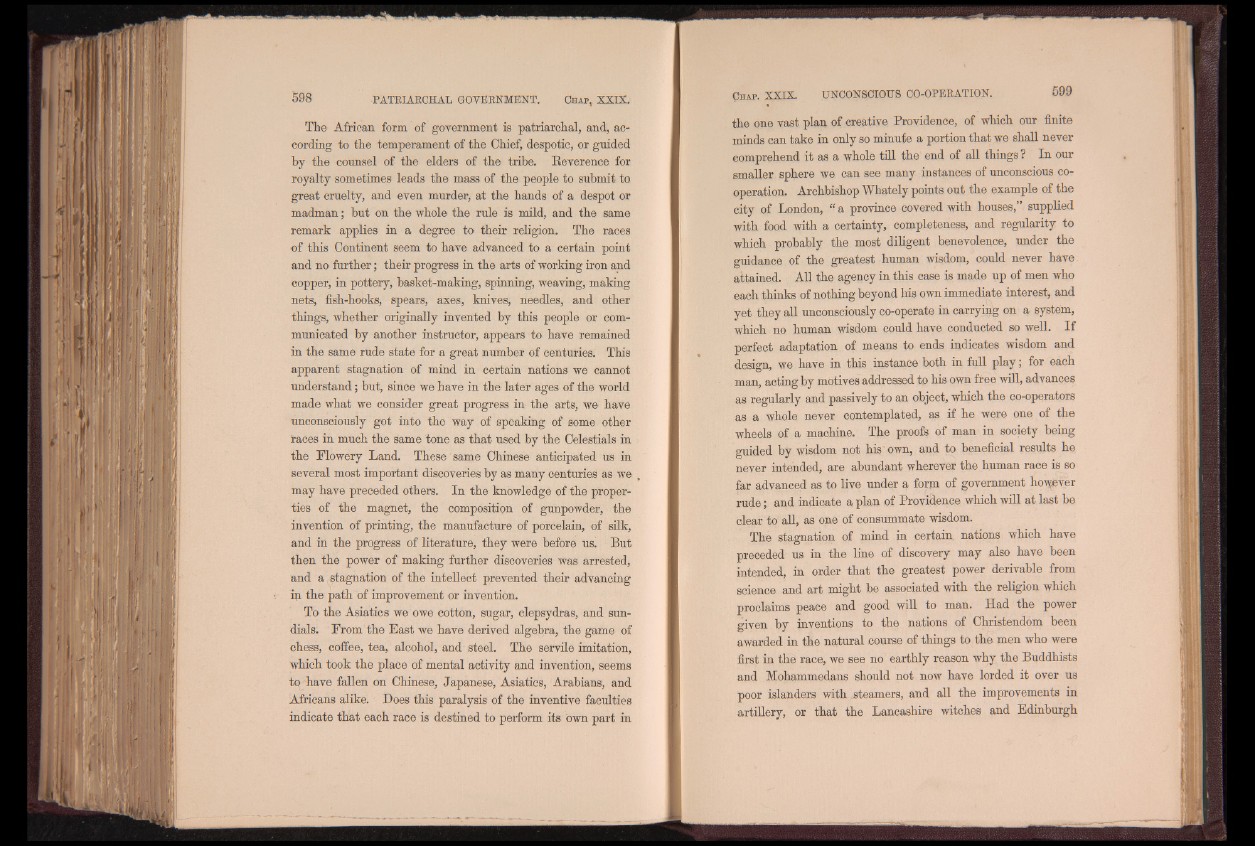
The African form of government is patriarchal, and, according
to the temperament of the Chief, despotic, or guided
by the counsel of the elders of the tribe. Reverence for
royalty sometimes leads the mass of the people to submit to
great cruelty, and even murder, at the hands of a despot or
madman; but on the whole the rule is mild, and the same
remark applies in a degree to their religion. The races
of this Continent seem to have advanced to a certain point
and no further; their progress in the arts of working iron and
copper, in pottery, basket-making, spinning, weaving, making
nets, fish-hooks, spears, axes, knives, needles, and other
things, whether originally invented by this people or communicated
by another instructor, appears to have remained
in the same rude state for a great number of centuries. This
apparent stagnation of mind in certain nations we cannot
understand; but, since we have in the later ages of the world
made what we consider great progress in the arts, we have
unconsciously got into the way of speaking of some other
races in much the same tone as that used by the Celestials in
the Flowery Land. These same Chinese anticipated us in
several most important discoveries by as many centuries as we
may have preceded others. In the knowledge of the properties
of the magnet, the composition of gunpowder, the
invention of printing, the manufacture of porcelain, of silk,
and in the progress of literature, they were before us. But
then the power of making further discoveries was arrested,
and a stagnation of the intellect prevented their advancing
in the path of improvement or invention.
To the Asiatics we owe cotton, sugar, clepsydras, and sundials.
From the East we have derived algebra, the game of
chess, coffee, tea, alcohol, and steel. The servile imitation,
which took the place of mental activity and invention, seems
to have fallen on Chinese, Japanese, Asiatics, Arabians, and
Africans alike. Does this paralysis of the inventive faculties
indicate that each race is destined to perform its own part in
the one vast plan of creative Providence, of which our finite
minds can take in only so minute a portion that we shall never
comprehend it as a whole till the end of all things ? In our
smaller sphere we can see many instances of unconscious cooperation.
Archbishop Whately points out the example of the
city of London, “ a province covered with houses,” supplied
with food with a certainty, completeness, and regularity to
which probably the most diligent benevolence, under the
guidance of the greatest human wisdom, could never have
attained. All the agency in this case is made up of men who
each thinks of nothing beyond his own immediate interest, and
yet they all unconsciously co-operate in carrying on a system,
which no human wisdom could have conducted so well. If
perfect adaptation of means to ends indicates wisdom and
design, we have in this instance both in full play; for each
maTtj acting by motives' addressed to his own free will, advances
as regularly and passively to an object, which the co-operators
as a whole never contemplated, as if he were one of the
wheels of a machine. The proofs of man in society being
guided by wisdom not his" own, and to beneficial results he
never intended, are abundant wherever the human race is so
far advanced as to live under a form of government hoyjever
rude; and indicate a plan of Providence which will at last be
clear to all, as one of consummate wisdom.
The stagnation of mind in certain, nations which have
preceded us in the line of discovery may also have been
intended, in order that the greatest power derivable from
science and art might be associated with the religion which
proclaims peace and good will to man. Had the power
given by inventions to the nations of Christendom been
awarded in the natural course of things to the men who were
first in the race, we see no earthly reason why the Buddhists
and Mohammedans should not now have lorded it over us
poor islanders with steamers, and all the improvements in
artillery, or that the Lancashire witches and Edinburgh